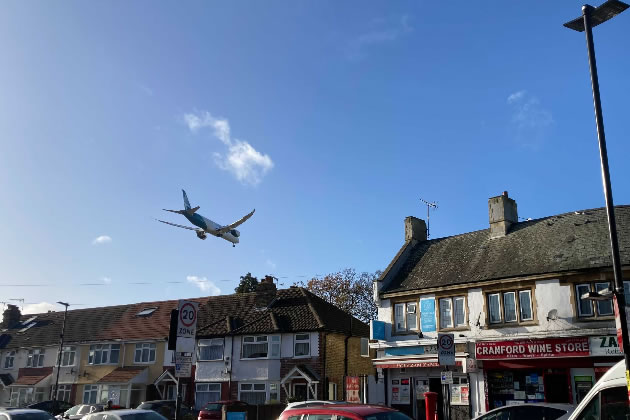Night Time Runway Alteration to Be Paused During Maintenance
No respite during week for residents under Heathrow flight paths
September 5, 2023
Runway maintenance at Heathrow lasting three years will cause “unacceptable levels of noise at night time” for West London residents, say campaigners. The UK’s busiest airport is making routine repairs to its runways which take place every 10 years causing changes to flight patterns, especially at night.
On Heathrow’s website about the maintenance work it explains: “Because Heathrow is so busy, this work needs to take place at night. That will mean changes to our runway alternation pattern, particularly for night-time flights.” It will mean that flights that are later than 10:30pm and before 6am will land on a single runway. Works are due to run from September 3 until Summer 2025.
This has prompted concerns from campaigners Stop Heathrow Expansion who say that certain residents living beneath particular flight paths will be badly affected. The airport says that for the initial phase of the work, all planes will use the northern runway five nights every week. The usual alternation between runways will continue on Friday and Saturday nights.
Stop Heathrow Expansion says that residents under the northern runway flight paths will have almost no respite from nighttime noise from the airport flights during the initial phase of work, followed by those under southern runway flight paths in the next phase.
According to the campaign’s research in the second half of August, there were 76 “extremely” late departures after 11:30pm. Stop Heathrow Expansion say only about half of the late departures were as a result of the disruption caused by the air traffic chaos on 28 and 29 August, with many happening before this incident occurred.
Justine Bayley, Chair of Stop Heathrow Expansion, criticises what he sees as a lack of transparency on the airport’s behalf, “We accept that the runways need resurfacing works every decade or so, but it is frustrating that this work has to take so long. It will cause unacceptable levels of noise at night time without the respite runway alternation normally provides – so many London and Thames Valley residents who live underneath its flight paths will potentially have their sleep disturbed for months on end.
“The airport has a duty to let as many people as possible know about this potentially serious impact on their sleep patterns before the event. Yet as the works commence, we see no visible signs of a pro-active information campaign reaching out to the communities affected.
“For many years, our campaign has adopted the slogan that Heathrow should be ‘better, not bigger’. Sadly, once again it is not living up to the test of ‘better’.”
Heathrow has admitted that the maintenance efforts will have negative as well as positive effects on residents but insists that the resurfacing work is vital. It says that since March it has made it clear that works were in the pipeline, briefing community forums, local MPs and authorities, as well as updating the public through community newsletters and its website. It also plans to make regular updates on its Twitter account @HeathrowRunways to keep nearby residents informed of noise patterns.
The airport says it is continuing to work hard to reduce its noise pollution, a process that will form part of the Heathrow 2.0 project. Key measures it has taken to mitigate noise and its impacts include the updated noise insulation scheme, offering financial support to cover noise insulation costs for local residents and the Fly Quiet and Green league table, incentivising airlines to use the quietest, most efficient aircraft at Heathrow.
A Heathrow spokesperson said: “We are committed to making Heathrow a quieter neighbour, and our noise footprint has already shrunk by more than a quarter since 2006. We have recently consulted on our latest noise action plan and are grateful to those took the time to share their views. Periodic maintenance such as runway resurfacing does require temporary changes to alternation patterns, however we will always limit these as much as possible to reduce the impact on our neighbours.”
Rory Bennett - Local Democracy Reporter
